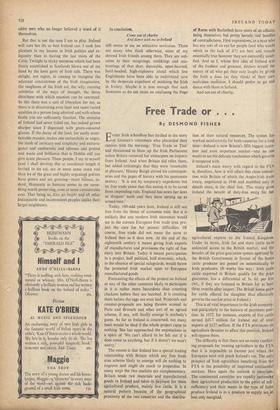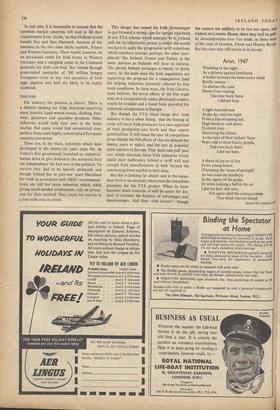• •
Free Trade or .
By DESMOND FISHER EVERY Irish schoolboy has thrilled to the story L/ of Grattan's volunteers who placarded their cannon with the warning : 'Free Trade or This' and threatened to blow up the Irish Parliament unless Britain removed her embargoes on imports from Ireland. And when Britain did relax them, but added irritatingly that they were `resumable at pleasure,' Hussey Burgh stirred his contempor- aries and the pages df history with his passionate oratory : `It is not by temporary expedients but by free trade alone that this nation is to be saved from impending ruin. England has sown her laws as dragons' teeth and they have sprung up as armed men.'
Today, 180-odd years later, Ireland is still not free from the threat of economic ruin. But it is unlikely that any modern Irish statesman would see in the current European free trade area pro- ject the cure for her present difficulties. Of course, free trade did not mean the same to Ireland then as it does now. At the end of the eighteenth century it meant giving Irish exports of manufactures and provisions the right of free entry into Britain. Today it means participation in a project, half political, half economic, which, in the absence of special safeguards, would throw the protected Irish market open to European manufactured goods.
Forecasting the effects of the project on Ireland or any of the other countries likely to participate in it is rather more hazardous than counting chickens before they are hatched. It is counting them before the eggs are even laid. Proposals and counter-proposals are being thrown around in Paris and Brussels and what sort of an agreed scheme, if any, will finally emerge is anybody's guess. As far as Ireland is concerned, not many tears would be shed if the whole project came to nothing. She has approached the negotiations in a spirit of 'We can't afford to be left out if it does come to anything, but if it doesn't we won't worry.'
The reason is that Ireland has a special trading relationship with Britain which any free trade area scheme likely to emerge will do nothing to improve and might do much to jeopardise. In many ways the two markets are complementary. Britain sends raw materials and, manufactured goods to Ireland and. takes in iiay" ment for them agrieulttiral produce, mainly live 'cattle. It is a .natural pattern because of the geographical proximity of the two countries and the distrihu- tion of their natural resources. The system has worked satisfactorily for both countries for a long time—Ireland is now Britain's fifth biggest custo- mer and most important market—and no one wants to see the delicate mechanism which governs it tampered with.
Ireland's main worry with regard to the FTA is, therefore, how it will affect this close connet tion with Britain of which the Anglo-Irish trade treaty, negotiated in 1948 and modified only in details since, is the chief link. This treaty gives Ireland the benefit of duty-free entry for her agricultural exports to the United Kingdom. Under its terms, Irish fat and store cattle have unlimited access to the British market, and the benefits of the price-guarantee system operated by the British Government in favour of the home cattle producer are passed on automatically to Irish producers. (It works this way : Irish store cattle exported to Britain qualify for the price guarantee, less a differential of 3s. Gd. per live ewt., if they are fattened in Britain for at lea; three months after import. The British home price for cattle offered for slaughter thus effectively governs the market price in Ireland.) This is of vital importance to the kish economy, and particularly to the balance of payMents post tion. In 1957, for instance, exports of live cattle earned £45.7 million for Ireland out of total exports of £127 million. If the FTA provisions on agriculture threaten to affect this position, Ireland will oppose them.
The difficulty is that there are so many conflict ing proposals for treating agriculture in the FT/ that it is impossible to foresee just where the European boot will pinch Ireland's toe. The only prospect of Irish agriculture benefiting from the FTA is the possibility of improved continental markets. Here again the outlook is uncertain. The continental countries are rapidly increasing their agricultural production to the point of self sufficiency and their wants in the type of fair produce Ireland is in a position to supply are a best only marginal. In any Case, it is reasonable to assume that the common market countries will tend to fill their requirements from 'inside,' so that Holland would benefit first and then Denmark, because of her nearness to. the two most likely markets, France and Western Germany. There would, however, be an occasional outlet for Irish butter in Western Germany and a marginal outlet in the Continent generally for Irish cow-beef. But visions through green-tinted spectacles of 300 million hungry Europeans ready to buy vast quantities of Irish eggs, pigmeat and beef are likely to be rudely shattered.
INDUSTRY For industry the position is clearer. There is a definite opening for Irish industries exporting stout, biscuits, hand-woven tweeds, clothing, foot- wear, glassware and speciality products. Other industries would hold their own in the home market. But many would find unrestricted com- petition from more highly industrialised European countries too severe.
These are, in the main, industries which were developed in the twenty-six years since Mr. de Valera's first government launched an industrial- isation drive to give Ireland in the economic field the independence she had won in the political. To survive they had to be heavily protected, and though Ireland has in post-war years liberalised her trade in accordance with OEEC recommenda- tions, she still has many industries which, while giving much-needed employment, rely on protec- tion for their survival. They could not survive in a free trade area in action. This danger has caused the Irish povernment to put forward a strong case for'spe4a1 treatment . in any FTA scheme which emerges.ln Ireland calls for an adjustment period in. whch she would not have to apply the progressive tariff reductions which members (except, perhaps, the other 'peri- pherals' like Iceland, Greece and Turkey in the same position as Ireland) will have to enforce. The period Ireland envisages is twenty to thirty years. At the same time the Irish negotiators are supporting the proposal for a readaptation fund for helping industries adversely affected by free trade conditions. In these ways, the Irish Govern- ment believes, the worst effects of the free trade area on a comparatively under-dbveloped country would be avoided and a fairer basis provided for economic co-operation in Europe.
But though the FTA cloud hangs over Irish industry it has a silver lining: that the freeing of trade will force Irish producers to a new appraisal of their production cost levels and their export potentialities. It will mean the spur of competition (even though the full effects of this are delayed for twenty years or more), and the lure of potential extra markets in Europe. This 'push-and-pull' pro- cess would eliminate those Irish industries which shield their inefficiency behind a tariff wall and compel Irish manufacturers to look beyond the contracting home market at their door.
But this is looking far ahead; and in the mean- time there is no certainty about even the immediate prospects for the FTA project. When its form becomes more concrete, it will be easier for Ire- land to estimate the balance of advantages and disadvantages. And then—who knows?—though the cannon are unlikely to be run out again, and trained on Leinster House, there may well be pub' lie demonstrations over free trade, as there were in' the time of ,Grattan, Flood and Hussey Burgh. But this time they will not be in its favour.















































 Previous page
Previous page